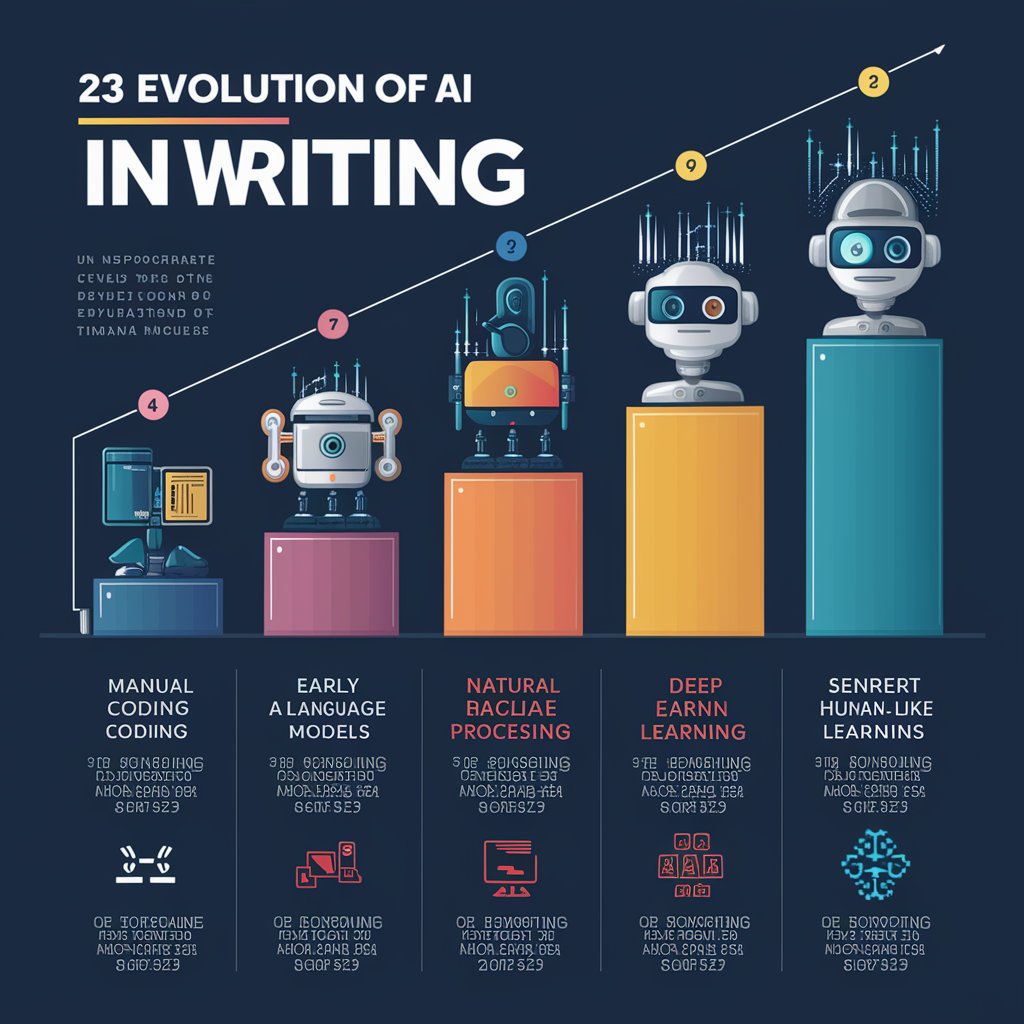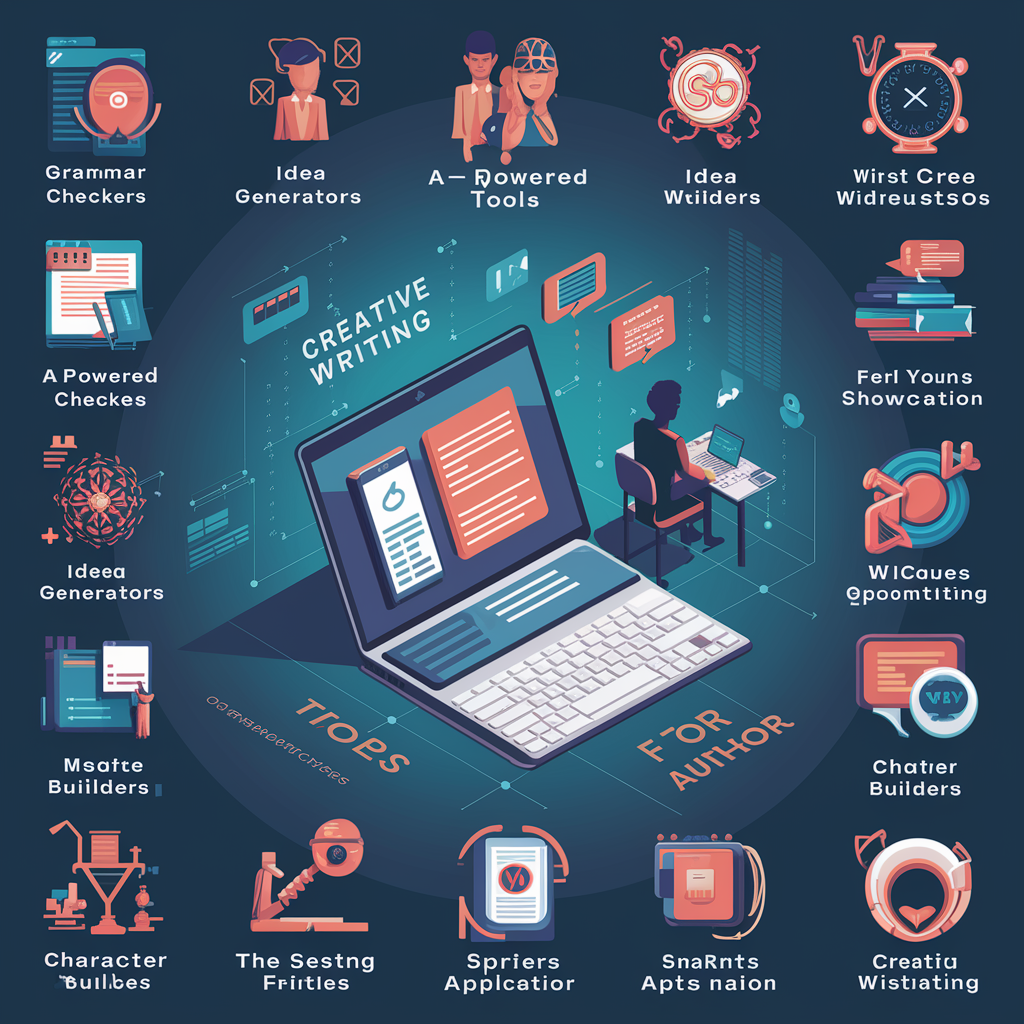In today’s digital age, artificial intelligence (AI) has become an invaluable tool for authors, transforming the way we approach the writing process. Whether you’re crafting a novel, writing a blog post, or developing academic content, AI can enhance your productivity and creativity. This article explores how AI can assist authors, highlighting various tools and offering practical tips for leveraging AI effectively in your writing journey.
The potential of AI in writing goes beyond mere assistance. It reshapes how authors plan, draft, and edit their work. By integrating AI into your writing process, you can streamline your workflow, gain new insights into your writing style, and produce higher-quality content with less effort. From grammar checks to content generation, AI offers a plethora of tools that can elevate your writing to new heights.
The Evolution of AI in Writing

Early Tools and Their Limitations
Early AI writing tools were primarily focused on basic grammar and spell checking, offering limited assistance to authors. These tools helped catch common errors but lacked the sophistication to understand context or style. While useful, they were often seen as rudimentary aids rather than comprehensive writing assistants. For instance, early spell checkers could identify misspelled words but struggled with homophones or context-specific language usage.
Moreover, these early tools often provided corrections without explanations, leaving authors to guess why a particular change was suggested. This lack of educational feedback limited the tools’ effectiveness in helping writers improve their skills. Consequently, while these tools were a step in the right direction, they were far from perfect, and many authors still relied heavily on manual proofreading and editing.
Advancements in Natural Language Processing (NLP)
Advancements in Natural Language Processing (NLP) have significantly enhanced the capabilities of AI writing assistants, allowing for more nuanced and context-aware support. NLP enables AI to understand and generate human language, making tools more adept at providing relevant suggestions, improving readability, and maintaining coherence in writing. For example, modern AI can distinguish between different meanings of a word based on context, offering more accurate grammar and style recommendations.
NLP advancements have also led to the development of more sophisticated features, such as tone analysis and sentiment detection. These capabilities allow AI tools to assess the emotional impact of a text and suggest modifications to align the tone with the author’s intent. As a result, AI writing assistants have become more reliable and versatile, offering support that extends beyond basic error correction to include style and content enhancement.
The Current Landscape of AI Writing Tools
Today, AI writing tools are more diverse and powerful than ever, offering a wide range of features to support authors in various aspects of their work. From generating content ideas to providing detailed style and tone suggestions, these tools have become essential companions for writers seeking to enhance their craft. Tools like Grammarly, ProWritingAid, and Jasper provide comprehensive support, from grammar checks to content generation, making them invaluable resources for writers at all levels.
Additionally, the integration of AI tools with other writing and productivity software has made them more accessible and user-friendly. Many AI writing assistants now offer browser extensions, desktop applications, and mobile apps, ensuring that authors can access their features anytime, anywhere. This seamless integration has further solidified AI’s role in the writing process, providing continuous support and enhancing the overall writing experience.
Key Features of AI Writing Assistants

Grammar and Spell Checking
One of the most fundamental features of AI writing assistants is their ability to detect and correct grammar and spelling errors. These tools not only highlight mistakes but also provide explanations and suggestions for corrections, helping authors learn and improve their writing skills over time. For example, Grammarly offers detailed explanations for its suggestions, allowing users to understand the rules behind the corrections and apply them in future writing.
Beyond basic grammar and spelling, these tools also address more complex issues, such as subject-verb agreement, punctuation misuse, and sentence structure. By offering real-time feedback, AI writing assistants help authors catch errors early in the writing process, reducing the need for extensive revisions later. This immediate feedback loop can significantly enhance an author’s confidence and efficiency.
Style and Tone Suggestions
AI tools can analyze your writing style and tone, providing suggestions to enhance readability and ensure consistency. Whether you’re aiming for a formal tone in a business report or a conversational style in a blog post, AI can help you achieve the desired effect by offering tailored advice. For instance, Hemingway Editor highlights complex sentences and passive voice, encouraging writers to adopt a clearer and more direct style.
Moreover, AI tools can adjust their recommendations based on the intended audience and purpose of the writing. By analyzing the context and the target readership, these tools can provide more relevant and effective suggestions, ensuring that your writing resonates with your audience. This level of customization helps authors maintain a consistent voice and style across different types of content.
Content Generation and Idea Development
AI can assist in generating content ideas and even writing initial drafts, helping authors overcome writer’s block and streamline their creative process. By providing prompts and suggesting relevant topics, AI tools can inspire new directions for your writing and facilitate the development of well-structured content. Tools like Jasper (formerly Jarvis) are particularly useful in this regard, offering a range of templates and prompts to kickstart the writing process.
In addition to idea generation, AI can help structure content by outlining key points and suggesting logical flow. This can be especially beneficial for long-form writing, such as articles and reports, where maintaining coherence and structure is crucial. By leveraging AI’s content generation capabilities, authors can focus more on refining their ideas and less on struggling to get started.
Research and Fact-Checking
Some AI tools offer research and fact-checking capabilities, allowing authors to quickly verify information and ensure the accuracy of their content. This feature is particularly useful for non-fiction writers and researchers who need to maintain credibility and reliability in their work. AI can scan vast amounts of data and provide relevant sources, saving authors time and effort in the research phase.
Furthermore, AI can help identify potential biases or inaccuracies in the text, promoting more balanced and objective writing. By cross-referencing multiple sources, AI tools can flag discrepancies and suggest areas that require further verification. This level of scrutiny ensures that the final content is both accurate and trustworthy, enhancing the author’s reputation for reliability.
Popular AI Writing Tools for Authors
Grammarly
Grammarly is a widely-used AI writing assistant known for its robust grammar and style-checking capabilities. It offers real-time suggestions for grammar, punctuation, style, and tone, making it an essential tool for writers aiming to produce error-free and polished content. Grammarly’s user-friendly interface and detailed feedback make it accessible to writers of all skill levels.
In addition to its core features, Grammarly offers a premium version with advanced capabilities, such as plagiarism detection and vocabulary enhancement suggestions. The tool also integrates seamlessly with various platforms, including web browsers, Microsoft Office, and Google Docs, providing consistent support across different writing environments. This versatility has made Grammarly a favorite among authors, students, and professionals alike.
ProWritingAid
ProWritingAid offers comprehensive writing analysis, providing detailed reports on various aspects of your writing. It covers grammar, style, readability, and more, helping authors identify weaknesses and improve their overall writing quality. The tool also integrates with popular writing software, making it convenient to use. ProWritingAid’s in-depth reports help writers understand their habits and tendencies, providing actionable insights to refine their craft.
ProWritingAid also offers unique features such as contextual thesaurus and sticky sentence analysis, which help authors diversify their vocabulary and reduce unnecessary complexity. These features, combined with the tool’s ability to analyze entire documents for consistency, make ProWritingAid a powerful ally for writers seeking to enhance their writing comprehensively.
Jasper (formerly Jarvis)
Jasper is an AI content generation tool that helps authors create high-quality content quickly and efficiently. It uses advanced algorithms to generate text based on prompts, making it a valuable resource for writers looking to produce content on demand. Jasper is particularly popular among marketers and content creators for its ability to generate engaging and relevant copy in various styles and tones.
Beyond content generation, Jasper offers features such as SEO optimization and long-form content assistance, which are crucial for writers looking to enhance their online presence. By incorporating keywords and optimizing content structure, Jasper helps authors create content that performs well in search engines, increasing visibility and engagement.
Hemingway Editor
Hemingway Editor focuses on improving readability by highlighting complex sentences and suggesting simpler alternatives. It aims to make your writing clear and concise, which is especially beneficial for authors who want to ensure their content is accessible to a broad audience. The tool highlights long, dense sentences, passive voice, and adverb overuse, encouraging authors to write more directly and effectively.
Hemingway Editor also provides readability scores, allowing writers to gauge how easily their content can be understood by different audiences. This feature is particularly useful for content intended for the general public, ensuring that it is easy to read and understand. By simplifying complex ideas and improving sentence structure, Hemingway Editor helps authors communicate their message more clearly and persuasively.
Tips for Using AI Writing Assistants Effectively
Understand the Tool’s Strengths and Limitations
While AI tools can be incredibly helpful, it’s important to understand their limitations and use them as a supplement to your skills. AI can provide valuable insights and suggestions, but it cannot replace the human touch in writing. Always review AI-generated content to ensure it aligns with your voice and intent. Recognizing the boundaries of AI’s capabilities will help you use these tools more effectively and avoid over-reliance on automated suggestions.
Moreover, AI tools can sometimes misinterpret context or provide inappropriate suggestions. Being aware of these potential pitfalls allows you to critically assess the recommendations and apply them judiciously. This balanced approach ensures that
your writing retains its originality and personal flair, while still benefiting from AI’s analytical capabilities.
Customize Settings to Suit Your Needs
Many AI tools allow for customization, enabling you to tailor their suggestions to better match your writing style and goals. Adjusting settings can help the tool understand your preferences, leading to more relevant and useful feedback. For example, you can set the desired tone, formality level, and specific writing goals, ensuring that the AI provides suggestions that align with your vision.
Customization also involves selecting the types of feedback you want to prioritize. If you’re focusing on improving readability, you can emphasize style and clarity suggestions. Conversely, if grammar is your main concern, you can adjust the settings to highlight grammatical errors more prominently. This flexibility allows you to fine-tune the AI’s assistance to meet your specific needs.
Regularly Review and Edit AI Suggestions
Always review and edit the suggestions provided by AI tools to ensure they align with your voice and the message you want to convey. AI is a powerful assistant, but it is not infallible. Taking the time to refine its suggestions will result in higher-quality content. By critically evaluating AI recommendations, you can incorporate only those that truly enhance your writing.
Additionally, this review process helps you learn from the AI’s feedback. Understanding why certain changes are suggested and deciding whether to implement them improves your writing skills over time. It also ensures that the final content is a true reflection of your style and intent, rather than a generic output from an AI.
Use AI to Enhance Creativity, Not Replace It
AI should be used to enhance your creative process, providing inspiration and support without overshadowing your unique voice. Let AI handle the mundane tasks, like grammar checks and basic edits, so you can focus on the creative aspects of writing. By offloading these routine tasks, you can devote more time and energy to developing your ideas and crafting compelling narratives.
Furthermore, AI can serve as a brainstorming partner, offering new perspectives and ideas that can spark your creativity. Use AI-generated prompts and suggestions as starting points, and build on them with your personal insights and experiences. This collaborative approach ensures that your writing remains original and authentically yours, while benefiting from AI’s analytical strengths.
The Future of AI in Writing
Emerging Trends and Innovations
Emerging trends in AI writing technology include improved context awareness and more intuitive user interfaces. Future AI tools are expected to offer even more personalized assistance, understanding individual writing styles and preferences to provide highly tailored feedback. Innovations such as advanced sentiment analysis and adaptive learning algorithms will enable AI to better understand and predict user needs.
Additionally, the integration of AI with other emerging technologies, like augmented reality and voice recognition, will create new possibilities for interactive and immersive writing experiences. These advancements will not only enhance the functionality of AI writing assistants but also make them more accessible and engaging for users, further revolutionizing the writing process.
Ethical Considerations and Challenges
The increasing use of AI in writing also raises ethical considerations, such as the potential for plagiarism and the importance of maintaining originality. Authors must use AI responsibly, ensuring that their work remains authentic and properly credited. It’s crucial to distinguish between AI-generated content and original writing, giving appropriate credit where due.
Furthermore, the reliance on AI tools can sometimes lead to a homogenization of writing styles, as many users might adopt similar AI-suggested changes. To counter this, writers should strive to maintain their unique voice and perspective, using AI as a tool to enhance rather than dictate their style. Ethical use of AI also involves being mindful of data privacy and ensuring that the AI tools employed do not compromise sensitive information.
The Role of Human Creativity
Despite the advancements in AI, human creativity remains irreplaceable, and the best writing will continue to be a collaboration between human authors and AI tools. AI can support and enhance the creative process, but the unique insights and emotional depth that humans bring to writing are unparalleled. Authors should embrace AI as a tool to augment their creativity, not as a replacement for it.
Human creativity involves empathy, intuition, and a deep understanding of cultural and emotional nuances, which are areas where AI still falls short. By leveraging the strengths of both AI and human creativity, writers can produce richer, more impactful content. This synergy ensures that the art of writing continues to evolve, with technology serving as a powerful ally rather than a competitor.
As you explore the benefits of AI writing assistants, it’s essential to equip yourself with a well-rounded toolkit that complements these advanced technologies. Our post on “5 Essential Tools for Every Writer’s Toolkit” delves into must-have resources for every writer. From powerful grammar checkers to productivity apps, these tools will help you enhance your writing efficiency and quality. Don’t miss out on this comprehensive guide to elevating your writing game.
Check out the full post here: 5 Essential Tools for Every Writer’s Toolkit
Embracing AI in Your Writing Journey

AI writing assistants have revolutionized the writing process, offering tools and tips that help authors produce high-quality content more efficiently. By understanding the capabilities and limitations of these tools, customizing their settings, and using them to complement rather than replace human creativity, authors can significantly enhance their writing.
Recap of Key Points
We’ve explored the evolution of AI in writing, the key features of modern tools, popular AI writing assistants, and tips for effective use. Each of these elements plays a crucial role in how AI can assist and improve the writing process. Understanding the historical context and technological advancements helps authors appreciate the current capabilities of AI tools and utilize them effectively.
By incorporating AI into your writing routine, you can benefit from real-time grammar and style feedback, content generation, research assistance, and more. These tools not only streamline the writing process but also provide valuable learning opportunities, helping you grow as a writer.
Encouragement for Authors
As AI technology continues to evolve, authors have a powerful ally in their creative journey. Embracing these tools can lead to even greater writing success, providing support and inspiration along the way. Don’t hesitate to explore and experiment with different AI tools to find the ones that best suit your needs. The future of writing is bright, with AI opening new possibilities for creativity and efficiency.
By staying open to new technologies and continuously refining your skills, you can leverage AI to enhance your writing and reach new heights in your creative endeavors. Remember, AI is here to support you, not replace you, and the best writing outcomes are achieved through a harmonious blend of human ingenuity and technological assistance.
Call to Action
Explore the AI writing tools mentioned in this article and discover how they can enhance your writing process today. Start with a tool like Grammarly or Jasper to see immediate improvements in your writing efficiency and quality. Experiment with different features and settings to find the perfect balance that suits your unique writing style and needs.
By integrating AI into your writing routine, you can unlock new levels of productivity and creativity. Don’t wait—take the first step towards enhancing your writing with AI tools and experience the benefits for yourself.
FAQ
Can AI replace human writers?
No, AI cannot replace human writers. While AI can assist with grammar checks, content generation, and style suggestions, the unique creativity and emotional depth of human writers remain irreplaceable. AI serves as a valuable tool to enhance and support the writing process, but the essence of creative writing lies in human ingenuity.
Are AI writing tools expensive?
Many AI writing tools offer free versions with basic features. Premium versions with advanced features may require a subscription fee, but they can be worth the investment for serious authors. The cost of premium plans varies, with some tools offering monthly or annual subscriptions to suit different budgets.
How accurate are AI grammar and spell checkers?
AI grammar and spell checkers are highly accurate, but they are not infallible. They can miss nuanced errors or suggest incorrect changes, so it’s important to review their suggestions carefully. Regularly updating the tool and customizing its settings can improve its accuracy and relevance to your writing style.
Can AI help with writer’s block?
Yes, AI can help overcome writer’s block by generating content ideas, providing prompts, and even writing initial drafts. Tools like Jasper are specifically designed to assist with content creation. By offering fresh perspectives and structured prompts, AI can inspire new directions for your writing.
Is using AI for writing ethical?
Using AI for writing is ethical as long as it is used responsibly. Authors should ensure that their work remains original and properly credited, using AI tools to enhance rather than replace their own writing. It is important to acknowledge AI assistance where appropriate and to use AI-generated content as a supplement to, not a substitute for, human creativity.
